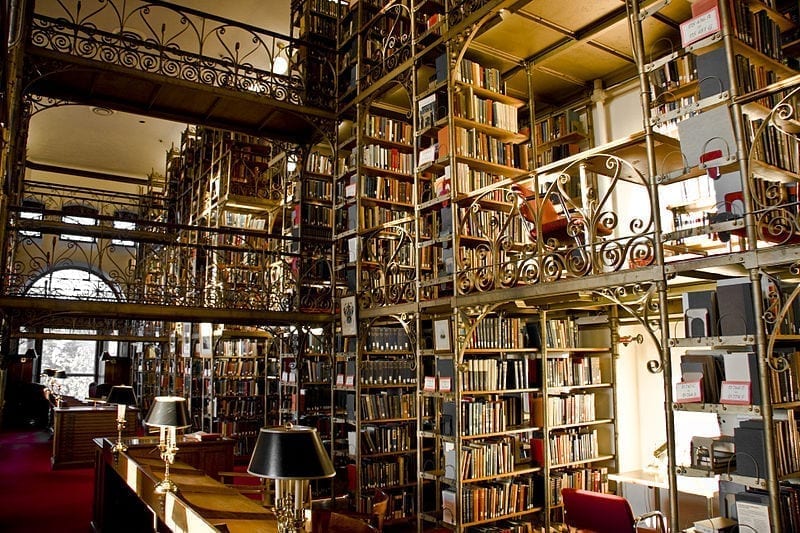Remember when we thought that the highest purpose of the internet would be vast, worldwide libraries, with all the knowledge of humanity at our fingertips?
The internet and World Wide Web may be one of the most complex, wondrous inventions humanity ever put together for itself. Conceived as a way to maintain open lines of communication during a nuclear war, what was only a twinkle in the eyes of computer scientists in the 1960s became a pop culture necessity by the 1990s. Back before the cute cat pictures, free amateur porn, and Facebook political memes, we thought it would unite people around the world. Getting to know our fellow travelers on this blue marble as real people, not as faceless strangers or enemies, was going to usher in an era of peace and understanding. It was the highest purpose of the Internet. Since that’s not working out for us so well, we should perhaps focus instead on the other highest purpose of the Internet, which is the free exchange of information.
Remember when the Internet was going to put the world’s libraries at our fingertips, where we could access them at any time? Whether it’s 4 o’clock in the afternoon and the kids are working on a project for school, or it’s 4 o’clock in the morning and you can’t sleep because international leaders with funny hair are inches away from starting that nuclear war, the Internet is there for us. And yes, Virginia, there are a multitude of libraries out there in The Cyber. Perhaps if this list makes it into their hands, those world leaders would learn a few things from perusing them, such as the vast heritage of knowledge and beauty that they’re one button from vaporizing. But I digress.
Do you like old music? The first batch of an early 20th Century 78 rpm record collection has just been digitized by George Blood Audio LP and was released online last week. The music can be downloaded in various formats to suit your taste and technical equipment, all for free. Check it out here! You can also join the project if you are so inclined.
If you’re a fan of vintage illustrations, you’re in luck. The British Library recently released a collection of more than a million copyright-free images from books in its collection that date back to the 17th, 18th, and 19th centuries. They’re conveniently arranged by theme and can be found at the British Library’s Flickr page, here. (It may take a moment to load.)
Across the pond, the Library of Congress digitized and released a collection of 2500 Japanese woodblock prints earlier this summer. The best-covered areas of the collection include actors, women, landscapes, and depictions of Westerners, from the 17th to the early 20th centuries. The collection is located here.
If Western art is more to your liking, the Guggenheim released over 200 art books available for free. Their digitizing project began in 2012 and has been growing ever since. Additions this spring include books covering the work of Pablo Picasso, Mark Rothko, Roy Lichtenstein, Egon Schiele and Gustav Klimt. Peruse the collection here.
More art books are available from the Getty Collection and The Met. Many images from the Met have been released into the public domain. They also have an archive of materials from 50 years of publications available here.
The good people over at the Physics Database have maintained a list of free science books. They’re listed alphabetically here, but the website also lists them by topic to make searches easier.
The Vatican also has a digital library where they’ve made available digitized manuscripts from a project that started in 2010. Eventually they hope to put about 80,000 works online, from the Middle Ages and Humanistic periods.

If you like classic literature such as Charles Dickens and Mark Twain, head over to the Classic Bookshelf’s electronic library. They have made many of your old high school lit class titles available at no charge. There’s also a list of other free literature sites here, but it may be a bit out of date.
A foodie blogger kindly posted a selection of free 18th and early 19th century cookbooks that are available through Google Books. Here’s that list.
For an ongoing, updated list of various free online educational media, check out Open Culture.
While the author did make an effort to make sure the links still worked and that the music, books, art, and other offerings were still available (and still free), things change over time and websites come and go. We also encourage you to be safe and use antivirus and malware detectors when downloading anything from the internet, because of course.
However ironic it seems to be worried about your computer’s safety when we’re pondering the existential threat of nuclear annihilation, it’s altogether possible that one of the funny-haired politicians will act like the adult in the room and step away from the button. If so, we may continue to reach across borders, trading knowledge and greetings, learning that the people who seem so unlike us aren’t so different after all. Maybe then, the highest purpose of the internet will be realized.
Peace.


Join the conversation!